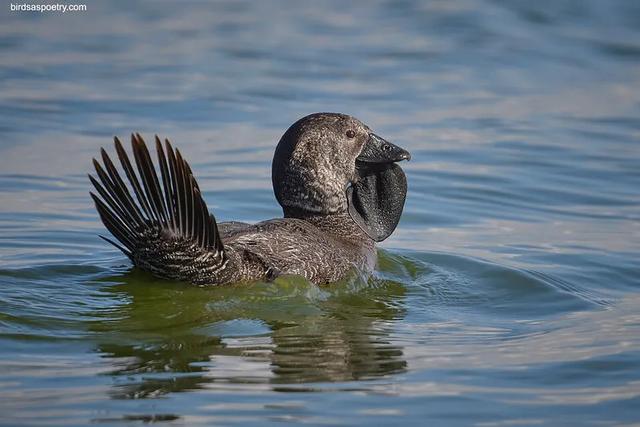有只动物不会打喷嚏(科学家发现一只会用英语骂人的鸭子)
一只麝鸭学会了用和人类一模一样的腔调说出“you bloody fool(你个傻子)”。研究作者们认为,它很可能将这句话用在求偶展示中。

一只雄性麝鸭。图片来源:I Am birdsaspoetry.com/Flickr, CC BY 2.0
编译 戚译引
鸭子的叫声给人单调、沙哑的印象,“公鸭嗓”甚至成了一个贬义词。但是近期发表的一项研究报告,澳大利亚特有的麝鸭能够模仿关门的声音和其他鸟类的声音,甚至能用与人类一模一样的腔调说出“you bloody fool(你个傻子)”。
Ripper the musk duck saying 'you bloody fool'音频:00:00/00:35
音频来源:ScienceAlert
这项发现让演化生物学家们兴奋不已。麝鸭和其他已知擅长模仿声音的鸟类之间的亲缘关系都很远,这些记录有助于扩展我们对鸟类发声学习现象及其演化过程的理解。相关论文近日在《英国皇家学会哲学会刊 B 刊》(Philosophical Transactions of the Royal Society B)发表。
1
麝鸭(Biziura lobata)是澳大利亚南部特有的一种鸭子,地位较高的雄性在繁殖季节会释放出类似麝香的气味,这就是它们名字的由来。它们体型庞大,雄性的喙下方还长着黑色的肉垂。
最新研究分析了三段麝鸭的录音,分别模仿了“you bloody fool”、开关门的声音和另一种鸭子的叫声。该论文第一作者、荷兰莱顿大学(Leiden University)的动物行为研究者 Carel ten Cate 说,他偶然在一本书中读到了这些报告,感到十分意外,千方百计找来了原始资料。
Ripper the musk duck imitating a door slamming音频:00:00/00:28
Ripper 模仿开关门的声音。音频来源:ScienceAlert
这些录音来自位于澳大利亚首都堪培拉西南部的特宾比拉自然保护区(Tidbinbilla Nature Reserve)。第一次听到的时候,“我真的惊呆了”,ten Cate 告诉 the Scientist。他甚至怀疑那是个骗局,因为鸭子来自于鸟类演化树中较原始的一支,被认为不具备鸣声学习(vocal learning)的能力。
经过一番查证,他才确认了录音的真实性。遗憾的是,该保护区的许多档案文件都在 2003 年 1 月的野火中被毁坏,许多细节已经难以考证。但 ten Cate 与当年录下录音的人取得了联系,揭开了录音背后的故事。
2
麝鸭是麝鸭属目前仅存的成员,其习性有很多独特之处。比如,鸭子和鹅往往出壳不久就能跟着亲鸟四处活动、学习觅食,但麝鸭出生后会待在巢里,由母亲喂养一段时间。它们也很少被人工饲养,主要是因为成年雄鸭对很多水鸟表现出攻击性。
那只会模仿开门声和“you bloody fool”的雄性麝鸭名叫 Ripper,由饲养员人工孵化并养育。两段录音录制于 1987 年,当时 Ripper 四岁。Carel ten Cate 说:“当时有一名饲养员给这只小鸭子喂食,照顾它,这很可能使得它对他产生了强烈的情感联结。它可能是在幼年和稍大一些的阶段学习模仿周围的声音。”那句“you bloody fool”很可能是饲养员的口头禅。
另一段录音则录制于 2000 年,来自一只无名雄性麝鸭,它模仿了太平洋黑鸭(Anas superciliosa)的声音,这是澳大利亚常见的另一种鸭子。关于录音的大部分信息已经在火灾中丢失,但可以确定的是,这只麝鸭是在圈养环境下由雌鸭养育的。
A different musk duck mimicking a Pacific black duck音频:00:00/00:20
另一只麝鸭模仿太平洋黑鸭的叫声。音频来源:ScienceAlert
Carel ten Cate 指出,麝鸭显然具备鸣声学习能力,但它们只有在不寻常的声音环境中才表现出这种能力,因为通常情况下它们会在同类的身边长大。
3
鸟类模仿其他鸟类甚至人造物品的声音,这种行为称为效鸣(mimicry)。例如伯劳会模仿小型鸟类的叫声,让猎物以为这里有同类。鹦鹉和琴鸟也都是著名的“口技大师”。
那么,鸭子和鹅所属的雁形目中,有没有可能还存在其他具有鸣声学习能力的物种,只是一直没有被发现?Carel ten Cate 认为不排除这种可能。他说,尽管鸭子和鹅都是常见的家禽,却从未被发现具有这种能力,但麝鸭是雁形目中独特的一支,或许可以从它的近亲物种中寻找。不过,麝鸭的分类学地位目前还没有得到充分的研究,所以目前无法判断哪些物种和它亲缘关系较近。
研究论文中介绍,两只麝鸭主要在展示行为中使用这些声音。雄性麝鸭的求偶行为有详细的文献记载。在求偶展示期间,它们昂起头,鼓起喙下方的肉垂,用脚朝各个方向踢起水花,摆动尾巴,同时发出拖长的叫声。如果 Ripper 在求偶过程中喊着“you bloody fool”,它的雌性同类恐怕也会像人类一样感到惊讶吧。
论文信息
【标题】Vocal imitations and production learning by Australian musk ducks (Biziura lobata)
【作者】Carel ten Cate and Peter J. Fullagar
【期刊】Philosophical Transactions of the Royal Society B
【时间】06 September 2021
【DOI】https://doi.org/10.1098/rstb.2020.0243
【链接】
https://royalsocietypublishing.org/doi/10.1098/rstb.2020.0243
【摘要】Acquiring vocalizations by learning them from other individuals is only known from a limited number of animal groups. For birds, oscine and some suboscine songbirds, parrots and hummingbirds demonstrate this ability. Here, we provide evidence for vocal learning in a member of a basal clade of the avian phylogeny: the Australian musk duck (Biziura lobata). A hand-reared individual imitated a slamming door and a human voice, and a female-reared individual imitated Pacific black duck quacks. These sounds have been described before, but were never analysed in any detail and went so far unnoticed by researchers of vocal learning. The imitations were produced during the males' advertising display. The hand-reared male used at least three different vocalizations in the display context, with each one produced in the same stereotyped and repetitive structure as the normal display sounds. Sounds of different origins could be combined in one vocalization and at least some of the imitations were memorized at an early age, well before they were produced later in life. Together with earlier observations of vocal differences between populations and deviant vocalizations in captive-reared individuals, these observations demonstrate the presence of advanced vocal learning at a level comparable to that of songbirds and parrots. We discuss the rearing conditions that may have given rise to the imitations and suggest that the structure of the duck vocalizations indicates a quite sophisticated and flexible control over the vocal production mechanism. The observations support the hypothesis that vocal learning in birds evolved in several groups independently rather than evolving once with several losses.
This article is part of the theme issue ‘Vocal learning in animals and humans’.
参考来源:
1. https://www.the-scientist.com/news-opinion/talking-duck-stuns-animal-behavior-researcher-69159
2. https://www.sciencealert.com/vocal-researchers-have-discovered-that-an-australian-musk-duck-would-swear-while-trying-to-mate
原标题:科学家发现一只会用英语骂人的鸭子,它这么做是为了求偶(有音频)
来源:科研圈
编辑:观山不易、yrLewis
,免责声明:本文仅代表文章作者的个人观点,与本站无关。其原创性、真实性以及文中陈述文字和内容未经本站证实,对本文以及其中全部或者部分内容文字的真实性、完整性和原创性本站不作任何保证或承诺,请读者仅作参考,并自行核实相关内容。文章投诉邮箱:anhduc.ph@yahoo.com






